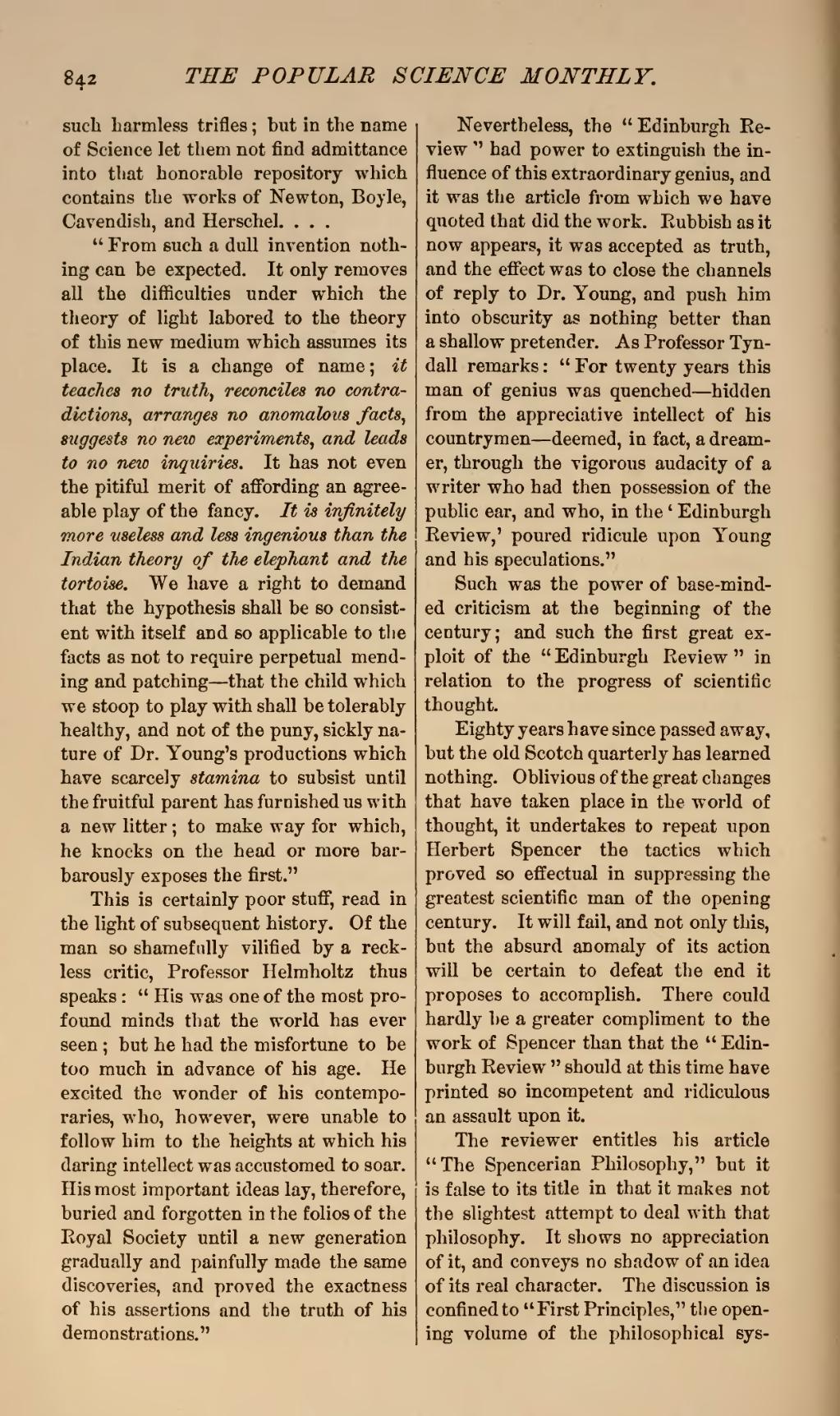such harmless trifles; but in the name of Science let them not find admittance into that honorable repository which contains the works of Newton, Boyle, Cavendish, and Herschel....
"From such a dull invention nothing can be expected. It only removes all the difficulties under which the theory of light labored to the theory of this new medium which assumes its place. It is a change of name; it teaches no truth, reconciles no contradictions, arranges no anomalous facts, suggests no new experiments, and leads to no new inquiries. It has not even the pitiful merit of affording an agreeable play of the fancy. It is infinitely more useless and less ingenious than the Indian theory of the elephant and the tortoise. We have a right to demand that the hypothesis shall be so consistent with itself and so applicable to the facts as not to require perpetual mending and patching—that the child which we stoop to play with shall be tolerably healthy, and not of the puny, sickly nature of Dr. Young's productions which have scarcely stamina to subsist until the fruitful parent has furnished us with a new litter; to make way for which, he knocks on the head or more barbarously exposes the first."
This is certainly poor stuff, read in the light of subsequent history. Of the man so shamefully vilified by a reckless critic, Professor Helmholtz thus speaks: "His was one of the most profound minds that the world has ever seen; but he had the misfortune to be too much in advance of his age. He excited the wonder of his contemporaries, who, however, were unable to follow him to the heights at which his daring intellect was accustomed to soar. His most important ideas lay, therefore, buried and forgotten in the folios of the Royal Society until a new generation gradually and painfully made the same discoveries, and proved the exactness of his assertions and the truth of his demonstrations."
Nevertheless, the "Edinburgh Review" had power to extinguish the influence of this extraordinary genius, and it was the article from which we have quoted that did the work. Rubbish as it now appears, it was accepted as truth, and the effect was to close the channels of reply to Dr. Young, and push him into obscurity as nothing better than a shallow pretender. As Professor Tyndall remarks: "For twenty years this man of genius was quenched—hidden from the appreciative intellect of his countrymen—deemed, in fact, a dreamer, through the vigorous audacity of a writer who had then possession of the public ear, and who, in the 'Edinburgh Review,' poured ridicule upon Young and his speculations."
Such was the power of base-minded criticism at the beginning of the century; and such the first great exploit of the "Edinburgh Review" in relation to the progress of scientific thought.
Eighty years have since passed away, but the old Scotch quarterly has learned nothing. Oblivious of the great changes that have taken place in the world of thought, it undertakes to repeat upon Herbert Spencer the tactics which proved so effectual in suppressing the greatest scientific man of the opening century. It will fail, and not only this, but the absurd anomaly of its action will be certain to defeat the end it proposes to accomplish. There could hardly be a greater compliment to the work of Spencer than that the "Edinburgh Review" should at this time have printed so incompetent and ridiculous an assault upon it.
The reviewer entitles his article "The Spencerian Philosophy," but it is false to its title in that it makes not the slightest attempt to deal with that philosophy. It shows no appreciation of it, and conveys no shadow of an idea of its real character. The discussion is confined to "First Principles," the opening volume of the philosophical sys-

